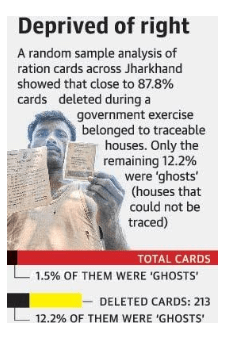UPSC Articles
‘Bulk of Jharkhand’s deleted ration cards weren’t fake’
Part of: GS Prelims –Polity and GS-II- Vulnerable section
In news:
The randomised control study found
- 90% of ration cards deemed fake and deleted by the Jharkhand government between 2016 and 2018 actually belonged to existing, valid households.
- Almost 56% of these deleted ration cards were not linked with Aadhaar.
- 18 starvation deaths have been reported in Jharkhand due to lack of access to subsidised food, mostly because beneficiaries’ ration cards were not linked to Aadhaar.
Government data
- 5.9% (1.44 lakh) ration cards were deleted out of a total 24.5 lakh cards
- Study found 88%, were found to belong to valid beneficiary families

Daily Current Affairs IAS | UPSC Prelims and Mains Exam – 21st February 2020
From Prelims Point of View:
Randomized controlled trial
- A randomized controlled trial is a type of scientific (often medical) experiment that aims to reduce certain sources of bias when testing the effectiveness of new treatments;
- This is accomplished by randomly allocating subjects to two or more groups, treating them differently, and then comparing them with respect to a measured response.
- One group—the experimental group—has the intervention being assessed, while the other—usually called the control group—has an alternative condition, such as a placebo or no intervention.
- The groups are followed under conditions of the trial design to see how effective the experimental intervention was.
- Treatment efficacy is assessed in comparison to the control. There may be more than one treatment group or more than one control group.
- Back in the late 1990s, this was not a well-known concept, let alone a widely practised research method. Moreover, research in economics was still largely theoretical although the shift in a more empirical direction had already started.











